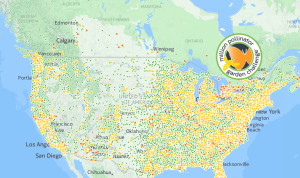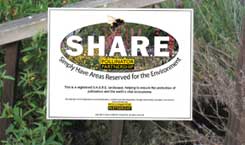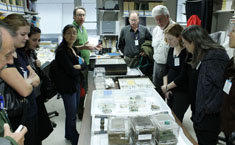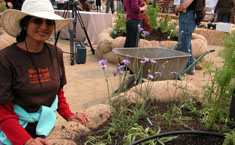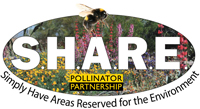S.H.A.R.E. (Simply Have Areas Reserved for the Environment)

Planting for pollinators is the first step – the second is registering the planted area on the pollinator S.H.A.R.E. map. It’s easy and connects you to all the great habitat, of every size, that is supporting bees, butterflies, and all pollinators.
Click here to get started by registering your site and be a part of SHARE and the Million Pollinator Garden Challenge.
Frequently Asked Questions:
Who can be involved?
Everyone! From homeowners, land managers, farmers, individuals, corporations, schools, roadside managers, to golf courses, everyone with a landscape can get involved in making a difference for pollinators - simply S.H.A.R.E!
Your efforts will be acknowledged on the S.H.A.R.E. habitat map available to view here.
How can I get involved?
Whether you are a farmer of many acres, land manager of a large tract of land, or a gardener with a small lot, you can increase the number of pollinators in your area by making conscious choices to include plants that provide essential habitat for bees, butterflies, moths, beetle, hummingbirds, and other pollinators. Register your S.H.A.R.E. landscape today!
What resources and materials are available to me?
- Materials downloadable for free on P2 website
- Access to pre-written FB messages to share with friends and colleagues
- E-newsletter contact from P2
Why should I get involved?
Pollinator health affects everyone! Worldwide, roughly 1,000 plants grown for food, beverages, fibers, spices, and medicines need to be pollinated by animals in order to produce the goods on which we depend.Foods and beverages produced with the help of pollinators include: apples, blueberries, chocolate, coffee, melons, peaches, potatoes, pumpkins, vanilla, almonds, and tequila. In the United States, pollination by honey bees, native bees, and other insects produces $40 billion worth of products annually.
Worldwide there is disturbing evidence that pollinating animals have suffered from loss of habitat, chemical misuse, introduced and invasive plan and animal species, and diseases and parasites. Many pollinators are federally “listed species,” meaning that there is evidence of their disappearance in natural areas. The U.S. has lost over 50% of its managed honeybee colonies over the past 10 years. A lack of research has hindered our knowledge about the status of pollinators. The E.U. has been so concerned that they have invested over $20 million investigating the status of pollinators in Europe.
Questions or Comments?
S.H.A.R.E.
Pollinator Partnership
423 Washington St. 5th Fl.
San Francisco, CA 94111
T: 415.362.1137
F: 415.362.3070
SHARE@pollinator.org
I love S.H.A.R.E! How can I become a sponsor?

